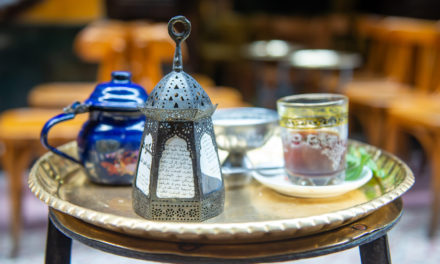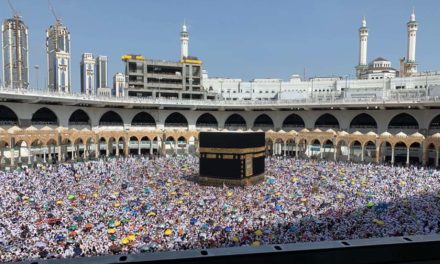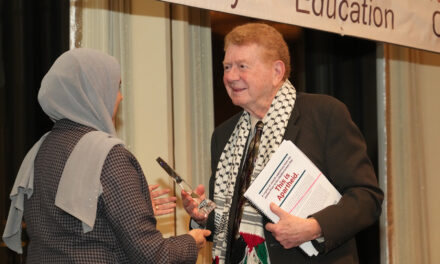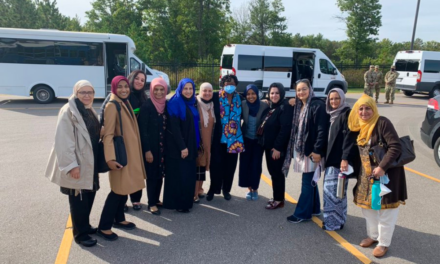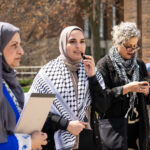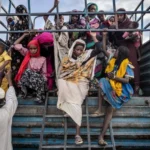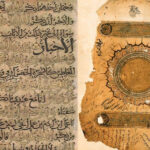Photo © Marwa Shalaby speaking at Brown University
Political scientist pioneered groundbreaking research on Arab parliaments
Marwa Shalaby ranked second among all the students graduating from Cairo’s famous Al-Azhar University in 2000. Earning a degree with highest honors, she was guaranteed the opportunity to continue her studies and secure a tenure track position. The next day she left Egypt.
“Why do you want to leave?” her mother pleadingly asked the only one of her four children moving away.
“I did not feel I would be able to accomplish what I wanted if I continued living and studying there,” said Shalaby in an interview with the Wisconsin Muslim Journal. A decade later and now a groundbreaking scholar, Shalaby is headed to the University of Wisconsin-Madison in August, “the right place for me and my scholarship,” she said.
Shalaby was hired as an assistant professor in the departments of Gender and Women’s Studies and Political Science as part of UW-Madison’s Arab Politics and Society cluster hiring initiative, which brings world-class academics to Madison to work together work to produce research and teach about the Middle East. With her new colleagues, Shalaby aims to “make UW-Madison one of the main destinations for Middle East studies.”
As the recipient of UW-Madison’s prestigious Julia Anna Cooper Fellowship, she was released from all service and teaching for the 2019-2020 academic year and received funding for research. She finalized the fieldwork for her current book project before moving to Madison.
Prior to joining UW-Madison, Shalaby was the Fellow for the Middle East and Director of the Women’s Rights in the Middle East Program at Rice University, Texas, where she created and led a team that conducted original data collection and extensive fieldwork in the Middle East and North Africa (MENA) region for six years. Her work resulted in the only comprehensive dataset on the functioning of parliaments in the region.
The first scholar in the world to produce research on Arab parliaments, Shalaby has published her work in academic journals and book chapters, and frequently presented at international conferences. She co-edited the book The Evolving Role of Women after the Arab Spring, (2016), and is often featured in major international media outlets, including CNN, Al-Ahram (Egypt), Fortune Magazine, the Washington Post, Houston Chronicle and others.
Shalaby talked with WMJ about her groundbreaking research, her move to Wisconsin and her Muslim faith.
Q & A with political scientist Marwa Shalaby, Ph.D.
What led you to pursue a career in higher education?
I always loved teaching. When I was little, I gathered all the children from our building and put them in front of me. The kids wanted to go play, but I captured them and held them hostage, threatening, “You cannot move from here until I finish my lecture.”
Your research focuses primarily on the politics of authoritarianism, and women in politics in the Middle East. What inspired you to pursue these topics?
When I was in Egypt, I was too young to realize what was going on, but there were so many inequalities (class, income, gender) and it bothered me. I felt like something was not right, but when you are in it, it is hard to understand it well. What is causing it? Why is this happening and how can we change it?
It’s very hard to change things if you don’t understand the root cause. I strongly believe the lack of females in politics, leadership and decision-making positions has a huge impact. So, that became my rationale—to study political science, gender and politics.
Did you grow up in Egypt?
I was born in Cairo, but raised in Kuwait. My parents left Egypt after the 1967 War. When Iraq invaded Kuwait in August of 1990, we went back to Egypt with my mother. (My father stayed in Kuwait until recently.) I was living in the Middle East until May 16, 2000. I lived the wars, the Islamic surge in the 1990s, the assassination of one president after another.
You left Egypt the day after you finished your undergraduate degree. Where did you go?
I went to France and studied at Sorbonne for a couple of years, then headed to the U.S. My husband was studying engineering at Northwestern so we moved to Chicago. After a couple of years, we went to Houston because he works in oil and gas. I started my Ph.D. at the University of Houston.
What was it like coming to the United States?
When we arrived in Chicago, everyone was so friendly and warm. I was so happy and impressed. I was veiled, more traditionally veiled than I am now. I was obviously Muslim and everybody was smiling at me. That was two weeks before Sept. 11. Two weeks later, it was really rough. Nothing bad happened to me, but for a year or more emotions ran very high, which I can totally understand. I saw America before and after.
You pioneered research on Arab parliaments. How did that come about?
I was interested in learning about women in parliaments—how they legislate, how they vote, propose bills, ask questions. I was shocked to learn there was no research on Arab parliaments. I couldn’t start to answer the gender questions because we didn’t know anything about Arab parliaments and how they functioned. So, I started with parliaments.
Scholars in the West have disregarded these parliaments. They thought since they work under authoritarian regimes, they are useless. Why bother? This void has created a significant bias in the whole discipline. In the top political science journals, you can find articles about parliaments in China, Russia, Vietnam and the Philippines—although all these countries have authoritarian regimes—but never on Arab parliaments.
When I applied to do my post doc at Rice University, I received an endowment for $3 million to do this research. I was there for six years. I recruited a lot of grad and undergrad students and post docs to work on intensive data collection.
Was it difficult for you and your team to collect data from across the Middle East?
I remember my first presentations five or six years ago. There was a lot of push back. People would say, “You’re never going to be able to get this data.” And I would say, “Watch me.”
I had to walk in parliaments and ask, make friendships and build trust. I spent six years in archives and basements, in meetings and in random conversations with random people in parliaments. We managed to collect a significant amount of data from many countries in the region. Now the work is done on Arab parliaments. All the gender components are in.
What do you plan to do with all this data?
I have enough data for a lifetime of research. Now we are working on analyzing it. So many publications have already come out, some of the first ever information about Arab parliaments. And I am working on a book right now on women in Arab parliaments; hopefully it will be out by next year.
My plan is at some point to make this data public. If we want to push this discipline forward, some data must be available for grad students and other junior scholars who want to know more about how these parliaments work.
What do you want to learn about women in politics in the Middle East?
I am very interested in how to get women in power and how to make their voices heard. What is the right way to do that in a very conservative society where traditions are strong?
What have you discovered about how to increase the role of women in politics?
Cultures change if you have the right mechanisms in place. If you are honest about promoting women’s rights and wanting them to be part of the democratic process, then you need institutional mechanisms like quota systems. The more women are in positions of power, the more culture will change and people will accept women in these positions. It doesn’t work the other way around. We can’t wait until society accepts women in these positions and then we start putting them there.
Why is it important to have more women in the parliaments?
Women are half of the society; it is not a privilege for them to be represented. From a justice and equity perspective, they must be an equitable part of every institution.
Some people argue that qualified women can’t be found.
This is a very poor argument because it assumes that all men who come to these positions are qualified and this is not true.
What other obstacles do you find limits women’s political representation in Arab countries?
In the Middle East, there are so many variations in the governance of the countries. From Egypt to Lebanon to Saudi Arabia to Oman, each place has its own challenges. At the same time, there is a dominate male perspective in decision-making.
What misconceptions do Western scholars have about the role of women in the Middle East?
People always think women’s lack of representation in Middle East governments is because of Islam. I challenge this. If Islam was the reason, you’d see a very uniform pattern across Arab countries, but that is not the case.
The other thing I find fascinating is the amount of invitations I receive to speak about hijab as a sign of oppression. I’m not sure why there is this obsession with hijab. If someone is wearing pants instead of a skirt today, why is that even relevant?
This focus on the hijab began with the Sept. 11 attacks and the discourse the U.S. government used in the Iraq and Afghanistan wars, as if we are fighting to liberate women from burkas. It’s not as if they want us to free them so they can wear bikinis and run out to the beaches.
All this talk about the hijab is counterproductive. Women in the Middle East have so many serious issues we can talk about—family laws, citizenship laws and guardianship laws, but the veil is not one of them.
What are your first impressions of Madison?
My interview was in December. Coming from Texas and Egypt, I thought, “How long will I be able to stand this?” But I really loved the city. Madison has its own special charm.
The other thing that got my attention was that people here are really sweet. I was a bit worried about coming here as a Muslim, wearing a veil. Will people be looking at me all the time? I was pleasantly surprised to find that people here are very welcoming.
You had several attractive job offers. Why did you choose to come to UW-Madison?
It is an amazing research institution, one of the top in political science and gender studies in the nation.
Another factor was the opportunity to work with Dr. Aili Mari Tripp, the chair of the Department of Gender and Women’s Studies. I am a big fan of her work. Our interests overlap. She is a political scientist by training like me. Her research focuses on women and politics in Africa, including North Africa, and I am focusing on similar issues in the Levant and the Gulf.
Have you met with Madison’s Muslim community?
I met some of them at a luncheon when I was there. They invited me for talks before the pandemic, but I was in the Middle East. They are very active. I can’t wait to attend their gatherings and see what they do, and learn more about their work.
What do you hope to accomplish at UW-Madison?
I look forward to working with students and getting them interested in the region. When I was at Rice, I fundraised to send 25 graduates and undergraduates to work on small projects in the Middle East and North Africa in the past five years. They came back with amazing work, and many of them went back and now live in the Middle East.
My goal is to build a community of students at Madison who are interested in the region and want to develop a deep understanding of it.

